Case Study Overviews
The case studies were selected from a variety of entities and examine overarching issues of regional importance. Together, they provide a tool box of actions and practices that can be used by other communities across our region as they respond to similar challenges and opportunities.
Case studies were conducted in Bay City, the Cypress Creek Greenway, Brazoria County, Galveston, Houston, and Huntsville.
These case studies demonstrate ways that the goals developed in Our Great Region 2040 can be applied to issues at the local level and in a variety of geographic contexts.
Although a limited number of case studies were conducted, a broad range of communities can use the recommendations and outcomes of the case studies if they share a similar geographic context or issue.
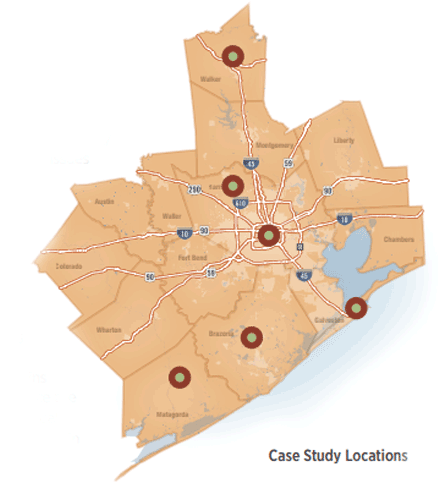
Bay City North Downtown Plan
New manufacturing facilities will bring an additional 900 jobs to Bay City in Matagorda County over the next five years. However the city currently lacks the housing options and retail amenities to accommodate a growing workforce, particularly younger workers.
This case study presents a master plan for a 40-acre, primarily vacant area, north of Bay City's historic downtown. Today, this area is unattractive to residents and visitors, but it also represents a potential site for a quality mixed-use development, offering a range of housing choices that can respond to the emerging market demand and add to the city's tax base.
The study recommends a phased approach to redeveloping this area, funded by a combination of public and private investments. The four-year plan includes projects such as building demolition and site clearing on city-owned properties; infrastructure upgrades; enhancements to waterways, parks, and trails; and streetscape updates, including sidewalks and plazas. Incentives and public-private partnership techniques are outlined to encourage private development, including apartments, townhomes, patio homes, traditional single-family homes, and mixed-use projects offering commercial and residential space.
This local example examines local implementation of strategies focusing on:
Economic Development
Environment
Housing
Transportation
Updates and Information
Bay City North Downtown Plan - Executive Summary
Bay City North Downtown Plan Final Report
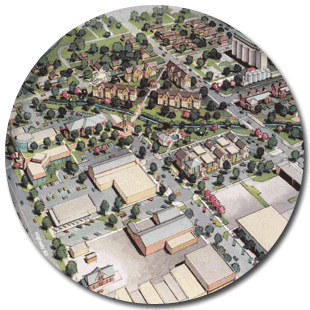
Project Partners
Bay City Community Development Corporation
Houston-Galveston Area Council
Kendig Keast Collaborative
CDS | Spillette - Market Analysis
Brazoria County Plan for Public Parks and Sustainable Development
Brazoria County's coastal ecosystem contains some of the highest quality natural areas in our region. Its bottomland forests, rivers, bayous, bays, and coastline provide wildlife habitat and recreational opportunities for residents and visitors alike.
This case study lays out a coastal master plan for the Brazoria County Parks Department that contains a new set of management practices to protect the county's coastal natural resources, along with strategies for accommodating new growth in ways that take advantage of the natural landscape. Major recommendations include phased expansion of the public parks system and other public lands and improving access and providing amenities such as trails, kayak launches, and educational displays. Conservation design techniques, such as preserving wildlife habitat within new developments, using native plants in landscape, and using natural systems to help buffer storm surges and store flood waters, are also detailed.
This local example examines local implementation of strategies focusing on:
Environment
Economic Development
Healthy Communities
Updates and Information
Brazoria County Plan for Public Parks and Sustainable Development
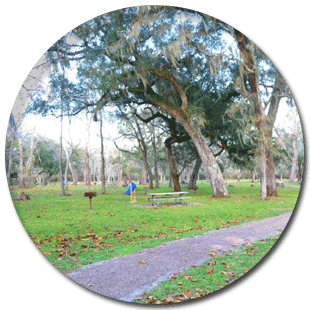
Project Partners
Brazoria County Parks Department
Houston-Galveston Area Council
Atkins North America
Smartt Grants
Cypress Creek Greenway Initiative
The Bayou Greenway Initiative aims to develop a network of parks and trails along the major bayous that flow across multiple jurisdictions, spanning many diverse communities in and around Harris County. Once complete, this greenway network will provide significant environmental, health, and quality of life benefits, along with the increased property values that are associated with recreational amenities.
This case study looks specifically at the necessary steps for creating the Cypress Creek Greenway, including funding sources and financing strategies. The study also addresses vehicles for promoting coordination among local jurisdictions including Harris County, municipal utility and other special districts, non-profit organizations, schools, neighborhood groups, and businesses.
See photos from this case study.
This local example examines local implementation of strategies focusing on:
Healthy Communities
Economic Development
Transportation
Updates and Information
Presentation to Utility Districts
April 8-9, 2013
Draft Resolution for Utility Districts
Stakeholder Advisory Group Meeting
Presentation from February 22, 2013
Stakeholder Advisory Group Meeting
Presentation from January 18, 2013
Houston Bayou Greenways
Map of Case Study Area
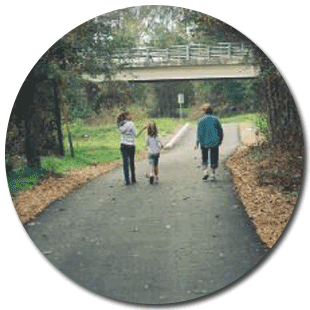
Project Partners
Houston Parks Board
Houston-Galveston Area Council
CDS | Spillette Consulting
City of Galveston Sustainable Return on Investment
Galveston continues to move forward on rebuilding efforts following the devastation of Hurricane Ike in 2008. To prepare for the future, the city seeks to better evaluate future public investments, based on financial considerations as well as social and environmental impacts.
This case study focused on developing a Sustainable Return on Investment calculator to assign monetary value to benefits and costs that are traditionally not included in such calculations, such as impacts related to greenhouse gases, safety, mobility, livability, water conservation, and waste reduction. This will act as a comprehensive cost-benefit tool for proposed city investments and initiatives.
The analysis was performed on three projects: building a million-gallon-per-day water reuse facility; streetscape and safety improvements for two streets near downtown; and creating a curbside recycling program. The results showed that curbside recycling would be beneficial and the streetscaping improvements would nearly break even. The water reuse facility project did not show a positive return on investment. The tool is available as an Excel-based model for other communities to use on similar projects.
This local example examines local implementation of strategies focusing on:
Resiliency
Economic Development
Environment
Transportation
Updates and Information
Galveston SROI Case Study Consolidated Report
Galveston SROI Water Model (XLS)
Galveston SROI Complete Streets Model (XLS)
Galveston SROI Recycling Model (XLS)
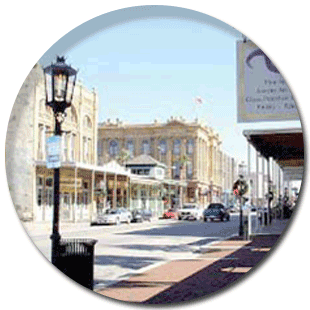
Project Partners
The City of Galveston
Houston-Galveston Area Council
CDS | Spillette
HDR
City of Houston Framework for Urban Development
Houston is experiencing a redevelopment boom, but current development codes are not generally geared toward creating dense and walkable urban places where multi-modal transit can be supported between concentrated areas of activity.
This study provides a framework that explores a series of opt-in tools and policies the city can use to encourage developments that provide more pedestrian- and bicyclist-friendly environments and promote a variety of commercial and residential uses. Such practices are intended to support existing centers, as well as stimulate emerging urban centers along transit corridors.
Key issues addressed by this study include pedestrian safety, parking, and urban design, along with strategies for promoting affordable housing. Recommendations include flexible opt-in development regulations, incentives, and market-based approaches that Houston, as well as other cities, can use in strengthening their regulations to achieve more walkable and transit-supportive development patterns.
See photos from this case study.
This local example examines local implementation of strategies focusing on:
Transportation
Economic Development
Housing
Updates and Information
Urban Houston Framework Executive Summary
Urban Houston Framework SAC Web Meeting from March 27, 2013
Urban Houston Framework Values Workshop Presentation from December 4, 2012
www.facebook.com/HoustonPlanning
www.publicworks.houstontx.gov/
www.houstontx.gov/planning/_urban/urban_cor.html
www.h-gac.com/community/livablecenters/default.aspx

Project Partners
City of Houston
Houston-Galveston Area Council
Design Workshop
CobbFendley
Walter P Moore
Petersgroup
Urban Core Collaborative
Harnessing Huntsville's Potential
Huntsville is seeking to diversify its jobs base and its housing stock. Making progress has proven difficult on both of these fronts, and the city has large amounts of land owned by the state and federal governments that is not available for development.
This case study outlines a strategy for the city to capitalize on development opportunities where land is available, especially in the area between downtown Huntsville and Sam Houston State University. It includes recommendations for improved sidewalks, bikeway connections, additional green space, and related economic development strategies to create positive branding for the city to use in attracting new businesses and residents.
The study provides a clear framework for addressing other priority issues, such as creating affordable housing options; increasing and diversifying the labor pool; and promoting business development, retention, and expansion. This case study is built on studies and plans the city has already completed and will serve as a guide to prioritize actions identified through these efforts.See photos from this case study.
This local example examines local implementation of strategies focusing on:
Housing
Environment
Transportation
Updates and Information
Harnessing Huntsville's Potential Report
Achieving Huntsville's Potential
Presentation from March 14, 2013
Harnessing Huntsville's Potential
Presentation from January 9, 2013
Harnessing Huntsville's Potential
Harnessing Huntsville's Potential
Presentation from December 12, 2012
Housing Choices, Job Opportunities,and Quality Education

Project Partners
The City of Huntsville
Houston-Galveston Area Council
Design Workshop
Franklin Associates

